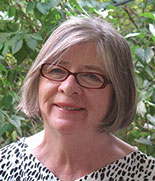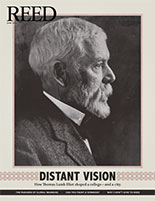
IRIS login | Reed College home Volume 93, No. 2: June 2014
Reediana
Living with a Wild God: A Nonbeliever’s Search for the Truth about Everything (Twelve/Hachette Book Group, 2014)
Barbara Ehrenreich ’63

Barbara Ehrenreich has long been an outspoken social commentator. A member of The Nation’s editorial board and the founding editor of the Economic Hardship Reporting Project (economichardship.org), she has explored cultural and social phenomena ranging from midwifery to warfare. Her best-known book is Nickel and Dimed, a vivid chronicle of her two-year immersion in the minimum-wage economy. She is also a self-described fourth-generation atheist.
What Ehrenreich is not known for is having any firsthand acquaintance with mysticism. But in Living with a Wild God, her 19th book, she reveals that throughout her teenage years, she repeatedly experienced otherworldly moments, which were as hard to describe as they were unsettling. One day, looking at a tree, she recalls, “something peeled off the visible world, taking with it all meaning, inference, association, labels, and words.”
Rather than confiding in her brilliant but preoccupied parents, she kept a journal in which she tried to make sense of these incidents. She sometimes took the reductionist view that “every now and then I simply stopped doing the work of perception and refused to transform the hail of incoming photons into named and familiar objects.” But she also wondered if these experiences had any bearing on the other question that consumed her young mind, namely, why do we exist?

Arriving at Reed in 1959, during what she calls “the great surge of scientific reductionism,” she resolved to focus on the building-block disciplines: mathematics, chemistry, and physics. But the thesis experiments that she set up with Prof. Jean Delord [physics 1950–88], measuring semiconductor effects on the corrosion of silicon, yielded inexplicable voltage oscillations that seemed to be almost supernaturally mocking her efforts to account for them.
By 1965, when she was a graduate student in quantum chemistry at Rockefeller University, her colleagues were facing the Vietnam draft and her research gave way to antiwar activism. By the ’70s, she was a married socialist with two children, and, as she puts it, “thoroughly embedded in the affairs of my species.” But after surviving cancer in her 50s, she began revisiting the questions laid out in her youthful journals, and the result is this remarkable memoir. In language that is always lucid, accessible, honest, and tinged with humor, she displays not just the intellectual courage to challenge her inherited one-note atheism but the audacity to speculate on the forms a consciousness beyond our own might take.

LATEST COMMENTS
steve-jobs-1976 I knew Steve Jobs when he was on the second floor of Quincy. (Fall...
Utnapishtim - 2 weeks ago
Prof. Mason Drukman [political science 1964–70] This is gold, pure gold. God bless, Prof. Drukman.
puredog - 1 month ago
virginia-davis-1965 Such a good friend & compatriot in the day of Satyricon...
czarchasm - 4 months ago
John Peara Baba 1990 John died of a broken heart from losing his mom and then his...
kodachrome - 7 months ago
Carol Sawyer 1962 Who wrote this obit? I'm writing something about Carol Sawyer...
MsLaurie Pepper - 8 months ago
William W. Wissman MAT 1969 ...and THREE sisters. Sabra, the oldest, Mary, the middle, and...
riclf - 10 months ago